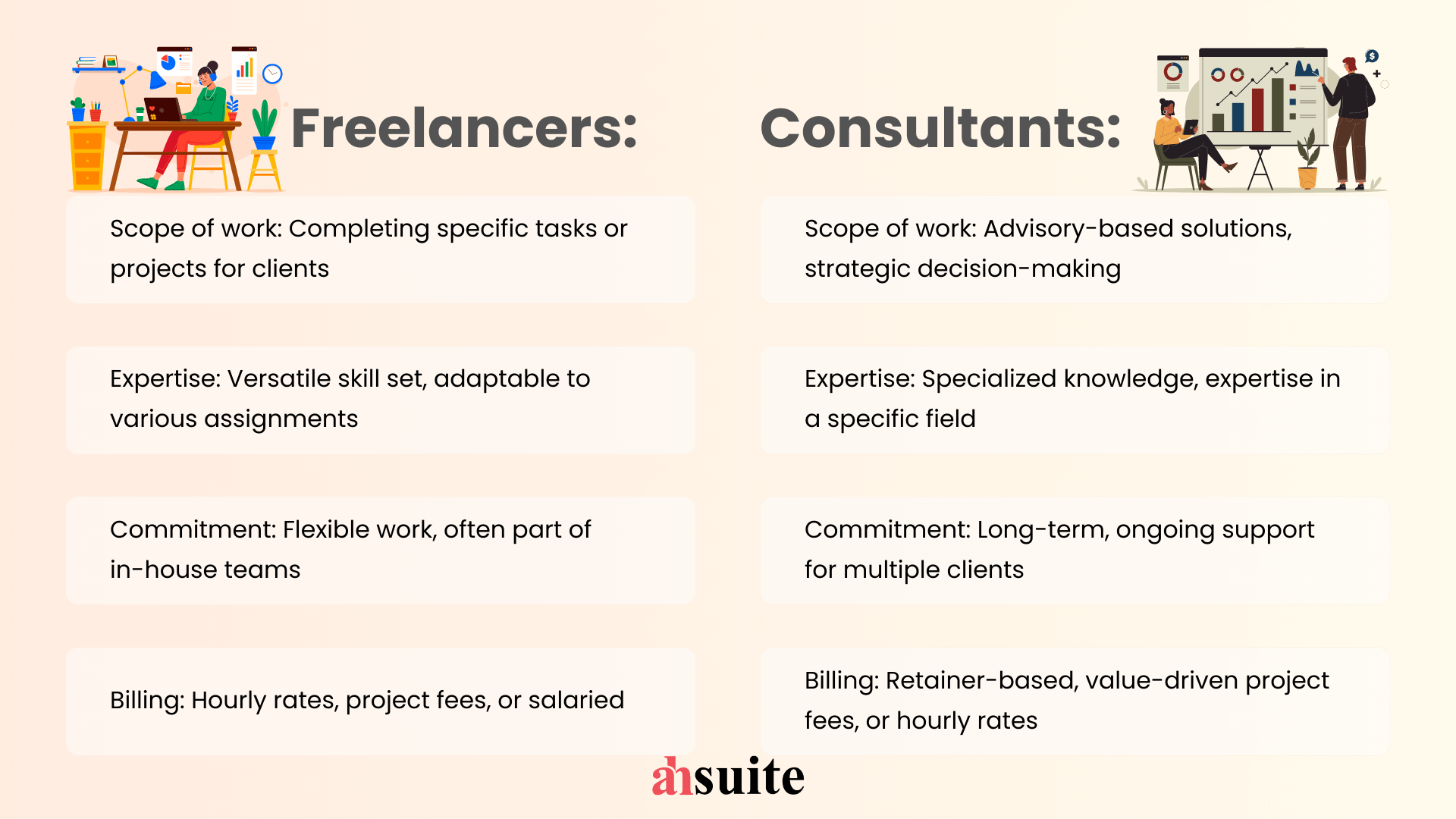Becoming a freelance consultant is an increasingly popular choice for professionals seeking flexibility and control over important aspects of their careers. You can leverage your expertise to help businesses across a wide range of opportunities solve problems, improve processes, and achieve their goals.
In this comprehensive guide, we’ll explore what an independent consultant is, what they do, and how you can become one to take advantage of this growing trend.
What is a Freelance Consultant?
A freelance consultant is an independent professional who provides expert advice and solutions to clients on a project basis. This career offers more flexibility than freelancing and the chance to work with diverse clients. Consultants leverage their skills to help businesses grow and enjoy a higher earning potential.
What Does a Freelance Consultant Do?
Freelance consultants support businesses in reaching objectives by creating, communicating, and implementing proven strategies to solve problems. They offer thought leadership, problem-solving, and strategic planning to enhance the client’s business performance. Consultants typically perform these activities:
- Providing expert advice and guidance to businesses.
- Developing strategies and plans to help companies achieve their goals.
- Training staff and improving processes.
- Assisting with project management and implementation.
- Analyzing data and identifying areas for improvement.
- Conducting research and staying up-to-date with industry trends.
- Collaborating with other professionals and stakeholders.
- Evaluating strategy effectiveness and making adjustments as needed.
A successful freelance consultant must be familiar with strategy consulting and robustly understand their clients’ needs. This involves actively listening to clients, asking the right questions, and analyzing their unique situations to provide tailored solutions.
By focusing on each client’s specific needs, business consultants can offer valuable insights and strategies that drive meaningful results for businesses across various industries. You don’t have to be a member of a consulting firm to get a consulting job.
Freelancers vs. Consultants
There are a lot of similarities between freelancers and independent contractors. Both work independently, with flexible work and across multiple clients. However, consultants are more involved in providing advisory-based solutions due to their expertise in the field.
Consultants focus on helping clients make strategic decisions and solve complex problems, whereas freelancers concentrate on completing specific tasks or projects for clients. In addition, freelancers are often salaried and are full-time members of in-house teams.

How to Become a Freelance Consultant
Do you consider working as a freelance consultant? In this guide, we’ll introduce you to the essential steps and strategies to help you succeed in this rewarding and flexible profession from zero to mastery. From defining your expertise to building your network, we’ve got you covered.
1. Define your area of expertise
Choose a specialty based on your skills, talent, and expertise. This could be an area you’ve worked in professionally or a skill set you’ve developed over time. Consider your passions and interests and the market demand for your services. It’s essential to deeply understand your chosen field to provide valuable insights and solutions to your clients.
2. Assess your skills and qualifications
Evaluate your current skills and qualifications, and identify any gaps that must be addressed. This involves acquiring new certifications, attending workshops, or gaining practical experience.
Hone both technical skills, such as data analysis or project management, and soft skills, like communication and problem-solving. These will help you stay competitive in the market, grow your business, and provide the best possible service to your clients.
Related: 10 Most High-Demand Freelance Skills in 2023
3. Build an online portfolio
Create an online presence showcasing your work, skills, and accomplishments. This can include a personal website, a LinkedIn profile, or a portfolio on a freelance platform. Become a thought leader by showcasing case studies, testimonials, and examples of your work. Build a reputation, demonstrate your expertise, and always expand the value you can bring to potential clients. Make sure that your online platform is professional, up-to-date, and easy to navigate.
4. Set your rates
Consultants should establish competitive rates in business consulting based on their niche, experience, and other industry-specific factors. Research the market to create an attractive rate for potential clients. Consider factors such as your expertise, location, and the complexity of the projects you’ll be working on.
Be prepared to negotiate your rates with clients, and don’t be afraid to charge what you’re worth. Keep in mind that as a freelancer, you’ll need to cover expenses like taxes, insurance, and equipment, so factor these costs into your pricing.
5. Network and market yourself
Steadily grow your professional network by attending industry events, joining online communities, and connecting with potential clients and collaborators. Consultport recommends utilizing online platforms like LinkedIn, Twitter, Fiverr, Upwork, and Facebook to promote your services and engage with your target audience.
Develop a marketing plan that includes content creation, social media promotion, and email marketing to reach potential clients and showcase your expertise. And lastly, make sure you’re always prepared to deliver professional reports and presentations. You’ll never know when an opportunity will arise to get hired.
Getting the first client is considered the most challenging part of becoming a consultant. But once you get the ball rolling, you can use your existing network to get more clients in your type of work.
6. Define your target market
Identify the types of clients and industries you want to work with. This can help you focus your marketing efforts and tailor your services to meet the needs of your target audience.
Consider factors such as company size, industry, and location when defining your target market. You may also choose to specialize in a specific niche, such as startups, nonprofits, or SMBs.
7. Establish contracts and agreements
Develop clear contracts and agreements outlining the scope of work, payment terms, and other essential details to ensure a smooth working relationship with your clients. This can help prevent misunderstandings and protect both parties in case of disputes.
Discuss your consulting plans with a lawyer to ensure your contracts are legally sound and cover all necessary aspects of your working relationship.
8. Deliver exceptional work
Consistently provide high-quality work and exceed expectations to build a strong reputation and secure repeat business. This includes meeting deadlines, communicating effectively, and being responsive to client needs.
By delivering exceptional work, you’ll increase your chances of getting referrals and repeat clients and enhance your professional reputation in your industry.
9. Continuously learn and evolve
Stay up-to-date with industry trends and developments, and invest in your professional growth through ongoing education and skill development. Attend conferences, workshops, and webinars, and read industry publications to stay informed about the latest best practices and innovations in your field.
Freelance Consulting FAQs
Curious about the world of freelance consulting? In this section, we’ll address some frequently asked questions, providing insights into payment methods, payment insights, and more.
What is the average salary of a freelance consultant?
The average salary for an independent consultant in the United States is $86,572 per year, with a range typically between $75,929 and $97,252. However, hourly rates can vary depending on factors such as experience, location, and project complexity.
How are freelance consultants paid?
Freelance/strategy consultants can be paid through various methods, including checks, PayPal, credit cards, electronic funds transfer (EFT), and freelance platforms. The choice of payment method depends on factors such as the amount, location of the client and freelancer, and the level of security and convenience required
What skills do you need to become a freelance consultant?
Skills required for freelance online consulting vary depending on the field of expertise. However, some common skills include problem-solving, communication, project management, and the ability to adapt to different industries.
What are the most common types of freelance consultants?
Independent consultants can specialize in various fields, such as marketing, management, finance, IT, human resources, and more. Some consultants may choose to specialize in a specific area, while others may offer a broader range of services.
Conclusion
We’ve explored the exciting world of freelance consulting, covering essential steps and strategies for success in this flexible and rewarding profession. From defining your area of expertise to continuously learning and evolving, becoming independent offers numerous opportunities for growth and autonomy.
To stay productive while managing multiple clients as an independent consultant, consider trying Ahsuite with a 30-day trial. This powerful tool can help streamline your workflow, allowing you to focus on delivering exceptional work and growing your freelance consulting business.

